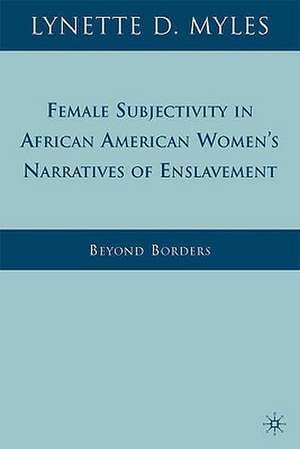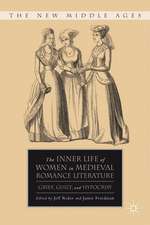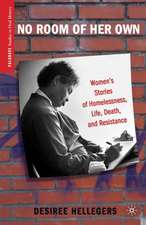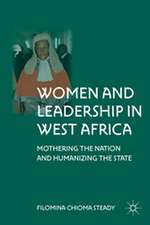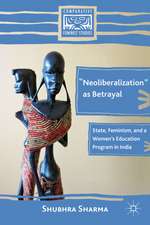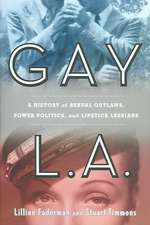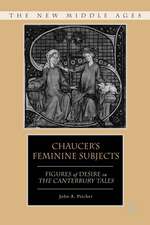Female Subjectivity in African American Women's Narratives of Enslavement: Beyond Borders
Autor L. Mylesen Limba Engleză Hardback – 18 noi 2009
Preț: 385.84 lei
Nou
Puncte Express: 579
Preț estimativ în valută:
73.84€ • 76.81$ • 60.96£
73.84€ • 76.81$ • 60.96£
Carte tipărită la comandă
Livrare economică 14-28 aprilie
Preluare comenzi: 021 569.72.76
Specificații
ISBN-13: 9780230615939
ISBN-10: 0230615937
Pagini: 195
Ilustrații: X, 195 p.
Dimensiuni: 140 x 216 x 15 mm
Greutate: 0.36 kg
Ediția:2009
Editura: Palgrave Macmillan US
Colecția Palgrave Macmillan
Locul publicării:New York, United States
ISBN-10: 0230615937
Pagini: 195
Ilustrații: X, 195 p.
Dimensiuni: 140 x 216 x 15 mm
Greutate: 0.36 kg
Ediția:2009
Editura: Palgrave Macmillan US
Colecția Palgrave Macmillan
Locul publicării:New York, United States
Cuprins
Introduction: Places, Borders, and Margins Black Female Movement: Conceptualizing Places of Consciousness for Black Female Subjectivity Location, Female Autonomy, and Identity in Pauline Hopkins's Contending Forces At the Crossroads of Female Autonomy, or Digression as Resistance in Quicksand and The Street Praisesong for the Widow : Crossing Location and Space Toward Female Consciousness and Wholeness Space and Time: The Interdependency of History, Identity, and Survival in Octavia Butler's Kindred Conclusion
Recenzii
"Myles Female Subjectivity in African American Women s Narratives of Enslavement is an ambitious, in-depth, detailed, and dynamic analysis of how and when black female literary figures move from pained and/or marginal existences to places of power and self transformation . . .Myles both informs and expands our understanding of black female movement as a self defining, and liberating act that is simultaneously transgressive and transformative." - Sapphire, author of Push and Black Wings & Blind Angels
"Out of a deep familiarity with the works of such multicultural theorists as bell hooks, Homi Bhabha, and Gloria Anzaldúa, Myles has crafted her own sophisticated conceptualization of a five stage process that evokes the intriguing idea of a Transient Woman struggling to recognize the intricacies of enslavement and move beyond the crippling effects of patriarchical hegemony . . .Myles has engaged in first rate theorizing about the complexities of transformative movement toward an enlightened conscious subjectivity." - Stanlie M. James, Director, African and African American Studies, School of Social Transformation, Arizona State University
"Drawing on criticism and theories from Black and Latina feminists and postcolonial studies, Female Subjectivity in African American Women's Narratives of Enslavement offers a refreshing exploration of African American women s literature. . . Detailing the stages of transient movement in the transformation to racial andgender consciousness, Myles explicates her concept for readers with cogent textual evidence from a range of Black women s fiction." - DoVeanna S. Fulton, Director, African American Studies and Chair, Women s Studies, University of Arizona
"Out of a deep familiarity with the works of such multicultural theorists as bell hooks, Homi Bhabha, and Gloria Anzaldúa, Myles has crafted her own sophisticated conceptualization of a five stage process that evokes the intriguing idea of a Transient Woman struggling to recognize the intricacies of enslavement and move beyond the crippling effects of patriarchical hegemony . . .Myles has engaged in first rate theorizing about the complexities of transformative movement toward an enlightened conscious subjectivity." - Stanlie M. James, Director, African and African American Studies, School of Social Transformation, Arizona State University
"Drawing on criticism and theories from Black and Latina feminists and postcolonial studies, Female Subjectivity in African American Women's Narratives of Enslavement offers a refreshing exploration of African American women s literature. . . Detailing the stages of transient movement in the transformation to racial andgender consciousness, Myles explicates her concept for readers with cogent textual evidence from a range of Black women s fiction." - DoVeanna S. Fulton, Director, African American Studies and Chair, Women s Studies, University of Arizona
Notă biografică
Lynette D. Myles teaches in the Department of English and African and African American Studies at Arizona State University.
